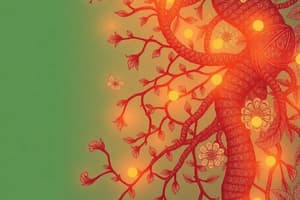Podcast
Questions and Answers
Ketone bodies are formed from the combination of fat fragments when carbohydrate supply is low.
Ketone bodies are formed from the combination of fat fragments when carbohydrate supply is low.
True
Ketosis is a condition where ketone body production is lower than their utilization, leading to a normal acid-base balance.
Ketosis is a condition where ketone body production is lower than their utilization, leading to a normal acid-base balance.
False
Liver reserves about two-thirds of the body's glycogen stores.
Liver reserves about two-thirds of the body's glycogen stores.
False
The liver breaks down glycogen and releases glucose into the blood through condensation.
The liver breaks down glycogen and releases glucose into the blood through condensation.
Signup and view all the answers
Muscle cells primarily use their stored glycogen to supply energy to body during rest.
Muscle cells primarily use their stored glycogen to supply energy to body during rest.
Signup and view all the answers
Brain cells store large quantities of glycogen as the main energy source.
Brain cells store large quantities of glycogen as the main energy source.
Signup and view all the answers
Glycogen is a light and compact form of energy storage for long term use in the body.
Glycogen is a light and compact form of energy storage for long term use in the body.
Signup and view all the answers
The brain and nerve cells prefer using proteins as their main energy source.
The brain and nerve cells prefer using proteins as their main energy source.
Signup and view all the answers
Body fat is directly converted into glucose during glucose deficiency in the body.
Body fat is directly converted into glucose during glucose deficiency in the body.
Signup and view all the answers
Adequate carbohydrates in the diet allow proteins to be utilized for their unique functions rather than for energy.
Adequate carbohydrates in the diet allow proteins to be utilized for their unique functions rather than for energy.
Signup and view all the answers
Study Notes
Ketone Body Production
- Fat fragments combine to form ketone bodies when carbohydrate-derived glucose is insufficient to meet the brain's energy needs.
- Ketone bodies serve as an alternative energy source during periods of starvation.
- Excessive ketone body production leads to ketosis, where ketone bodies accumulate in the blood, disrupting the body's acid-base balance.
Glycogen Storage and Use
- The liver stores approximately one-third of the body's glycogen, releasing glucose as needed.
- Excess glucose is converted to glycogen through condensation.
- When blood glucose levels decrease, the liver releases glucose by breaking down glycogen through hydrolysis.
- Muscle cells store the remaining two-thirds of the body's glycogen.
- Muscle glycogen is used directly during exercise.
- The brain maintains small amounts of glycogen as a reserve during severe glucose deprivation.
Glycogen Characteristics
- Glycogen is bulky as it holds water.
- Glycogen stores are sufficient for a short duration (less than a day at rest, and a few hours during exercise).
- Fat is the preferred long-term energy reserve.
Glucose Production from Protein
- Glucose is the primary energy source for brain cells, nerve cells, and developing red blood cells.
- Protein is converted to glucose when glycogen stores are depleted – a process called gluconeogenesis.
- Protein has essential functions that cannot be replaced by other nutrients.
- Body fat cannot be converted to glucose.
- Adequate carbohydrate intake prevents protein from being used as an energy source, a phenomenon known as protein-sparing action.
Studying That Suits You
Use AI to generate personalized quizzes and flashcards to suit your learning preferences.
Description
Test your knowledge on ketone body production and glycogen storage. This quiz explores the biochemical processes involved in energy metabolism during glucose scarcity and the role of glycogen in the body. Assess your understanding of how these processes affect the brain and muscles and learn key facts about ketosis.




